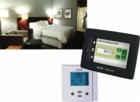Next-generation energy solutions for hotels

Hotels are facing new energy challenges, and Sophie Ranson explains how building and energy-management systems are being used to reduce carbon emissions in the hotel industry.During the past three years, the hospitality industry has seen energy costs rise by 40%. The hospitality industry in UK and Ireland has the highest energy usage in Europe, at up to 378 kWh/m2 per year. This industry spends over £1 billion per year on energy, which can be one of the largest elements of expenses after staff costs and should not be considered as a fixed overhead. It is critical to know where that energy is being used. The hospitality industry is facing new challenges in terms of energy usage, and building management has the most potential to improve energy efficiency. Surprisingly, lighting is not the biggest user of energy. 17% of the energy used in hotels is for water heating, and leading hotels have now moved beyond changing light bulbs. The hot topics this year, and for the next few years, will be energy costs, being efficient and being environmentally aware. So what can hotels do to reduce their carbon footprint? There have been significant improvements in building-management solutions, speci- fically for hotels. Building and energy-management systems (BEMS) are now easy to use. Until recently, BEMSs were complicated and could not be used by the hotel staff. Today in the era of the iPod Touch and touchscreen mobile telephones, BEMSs use advanced touchscreen technology as a front end. Indeed, 18 cm high-quality touchscreens are now available from leading vendors. For example, the Cylon SiteGuide has a simple 3-button navigation that allows anyone to understand how to use it. As the SiteGuide uses an IP connection, the whole hotel can be accessed from any location by the hotel staff. The difficulty in modifying time schedules and setpoints such as temperature in hotels where there is no ‘head-end’ supervisor is a typical complaint from staff. Thus, these systems were not adaptable to the customer needs, or events which could lead to energy wastage. Today, staff can change time schedules according to specific events such as conferences and weddings without having to wait for an engineer. The use of an intuitive touchscreen device makes the change of setpoints and schedules easier and finally accessible to staff, who can take control their environment and save energy. The Opera Reservation System from Micros-Fidelio is the leading computer reservation system in the hospitality industry. BEMS can now be integrated with it, so energy can be saved by having rooms at lower-energy setback when they are not booked. A digital signal is picked up from the reservation system when the room is checked in. The BEMS then puts the room into comfort conditions. For example, with our UnitronUC32 system, up to 2000 rooms can be handled using a single gateway. With this type of solution all rooms must be connected to the BEMS. Hotels which have stand-alone fan-coil control are learning from their mistakes, and new specifications ensure the property is fully networked. The hospitality industry is becoming more and more competitive with the opening of leisure centres including spas, swimming pools and gyms. Energy management can become challenging in such environments. Rooms are no longer the largest area for energy use in such leisure destinations. Each function is often its own profit centre and needs local control of the BEMS as well as clear energy reporting. BEMS can be easily combined for any size of organisation — from a single-property hotel to global, multi-branded hotel chain environments. Advanced energy-management systems ensure occupant comfort while actively reducing energy consumption and costs. Leading vendors provide unitary room displays for individual fan-coil control. These user-friendly controllers allow the room occupant select their desired temperature within the bands that they set, using LCD screens. It can also be linked to the in room key card to save even more energy. An unoccupied room will automatically fall back to a more energy efficient temperature. Recent improvements and innovations have made BEMS more and more adapted to the hospitality industry. BEMS is finally accessible to staff, can be integrated with the leading computer reservation system, meets the needs of all types of hotels and ensures occupant comfort. Significant energy savings are achievable through efficiently managed heating, ventilation, cooling and lighting. The Cylon experience is that a modern BEMS can help hotels save 5 to 25% on their annual utility bills. By reducing their energy usage and, thus, their operating costs and making their business more environmentally friendly, hotels can thrive — even in today’s challenging times.
Sophie Ranson is marketing executive with Cylon Controls.
Related links:
Related articles:


